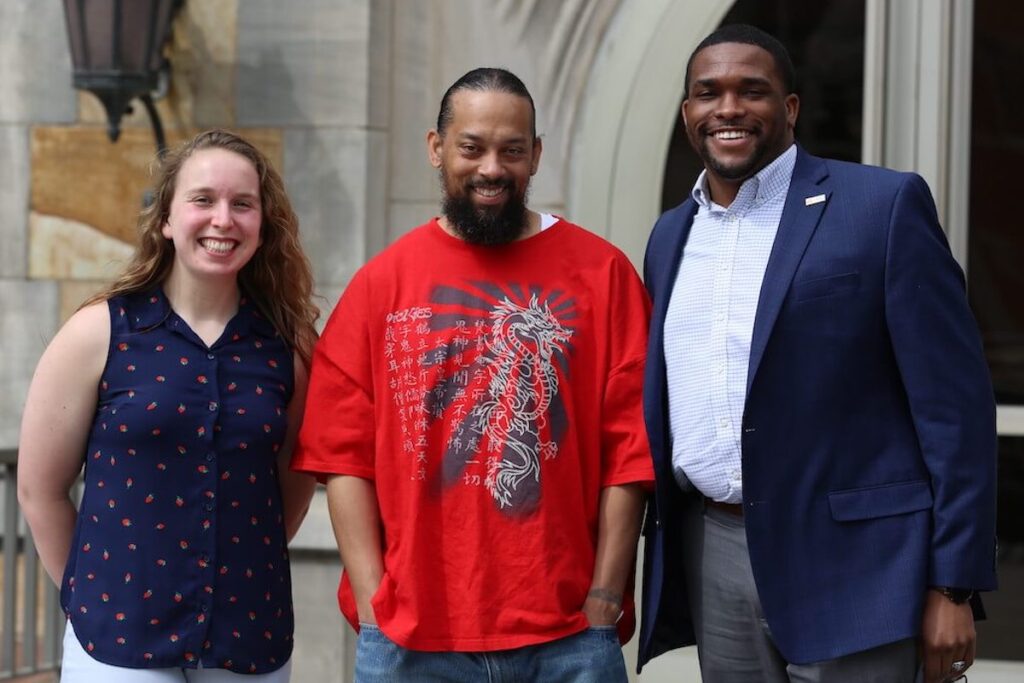As the Fall 2020 semester was getting underway, students at the College of Law were questioning how they would gain the knowledge they needed, and how they could develop the necessary partnerships with professors and each other to gain the sorts of skills they expected law school to provide.
The COVID-19 pandemic had postponed court proceedings, forcing professors to reexamine curriculum and find non-traditional casework for students to undertake to gain practical experience.
It was a challenge that led Professor Wendy Bach to reach out to College of Law alumna, Beth Ford.
“We learned that the Federal Defender’s Office in the East District of Tennessee was overwhelmed with cases that had to be litigated by their office,” Bach said.
So with Ford’s assistance, Legal Clinic students in Bach’s class were assigned to assist with 10 cases. Two of those students, Kayla Rask and Johnelle Simpson, worked on the case of William Lamar Bost, who at the time was incarcerated at the Federal Correctional Institution, Butner Low, a low-security federal prison in Butner, North Carolina.
They learned that because Bost suffered from type 2 diabetes and hypertension, he was particularly vulnerable for contracting COVID-19. Bost had unsuccessfully petitioned the warden to grant him a compassionate release. Simpson and Rask worked together on his behalf to file a motion in U.S. District Court requesting a reduction of Bost’s sentence.
In their motion to the court, Simpson and Rask outlined Bost’s plan to return to his hometown of Knoxville, live with his fiancée and care for their daughters. Prior to his arrest and incarceration, Bost held a job with a cleaning company and he also planned to return to his position.
Rask said while she was sympathetic to the risk Bost faced, she approached the case with some hesitation. She is the daughter of two attorneys and had gained experience with sentencing during her first summer of law school while working as a clerk for former Judge Pamela Reeves.
“I had a jaded perspective of defense in the criminal justice system,” Rask said. “I had a privileged upbringing, so I was very apprehensive from the beginning.”
But throughout her work with Bost and his fiancée, Chantel O’Neal, Rask said her perspective began changing.
“With each day that I became more involved with the case and began interacting with Mr. Bost and Ms. O’Neal, I found it harder and harder to justify his imprisonment,” Rask said.
Rask said she questioned the appropriateness of the sentence Bost received for the crime he committed. But the argument she and Simpson put forward in their motion focused on the health risk their client faced in light of the more than 600 positive cases of COVID-19 that had been reported in the Butner facility.
With its “dormitory-style housing” in “a bunk-style bed that is less than six feet apart from other inmates,” the arrangement “places Mr. Bost in grave danger of contracting COVID-19,” their motion states. “Further FCI Butner Low has suspended many of the activities at the facility and limits inmates to three hours outside of the facility per week. As a result of these changes, inmates spend most, if not all, of their time in a shared, indoor space.”
Rask and Simpson researched and wrote the motion with Simpson gathering information from O’Neal and Bost. Without the keen insights from O’Neal, Simpson said the work would have been much more difficult.
“She had worked as a paralegal, so she understood what was required in our documentation, and she knew how to provide the information we needed,” Simpson said.
Like Rask, as Simpson became more involved with the case, his understanding of how to best represent a client began to evolve. As a Black male student attorney representing a Black male client, Simpson said he was troubled to see “up close and personal” how race can affect sentencing.
“When it comes to the law, and how mandatory sentencing is implemented, Mr. Bost has seen a lot,” Simpson said. “The disparity in what happens to black versus white defendants is troubling,” Simpson said.
Simpson said defending Bost helped him understand how the importance of good communication when defending a client. Throughout the process of several weeks, Simpson interviewed Bost’s mom, his aunt and even his former employer. The interviews helped him understand and make the best argument possible on his client’s behalf.
“Justice happens slowly, and fortunately for lawyers, that’s how we make our money. But the client needs to know what’s happening, and it’s important to check in with them,” Simpson said. “These people have their lives on the line and they are owed the respect of knowing where you are in the process.”
Ultimately, Rask and Simpson’s motion on behalf of Bost convinced the court that he should, indeed, be released.
Bost didn’t trust the news when it finally came in March 2021.
“The day he called me and told me that the judge granted our motion, I didn’t say nothing,” Bost said. “I had been beat over the head so many times, and I couldn’t believe it finally happened.”
Since his release, Bost has resumed the life he promised to live, working in the business he ran prior to his arrest. He says he’s grateful for the representation he received from the UT Legal Clinic, but more importantly, he hopes his case might influence changes in the law.
Bach said she is gratified to have been able to provide students with an opportunity for collaboration that extended beyond the stack of motions, court orders and other documents.
The semester was about “teaching the students that, even when the world seems out of control, lawyers can use their skills to make things just a little bit better,” Bach said.
Simpson and Rask experienced “how to make the best of their partnership and the partnership with their client to accomplish what seemed at first like an impossible goal,” she said. “That’s some of the best of what we’re trying to teach.”
